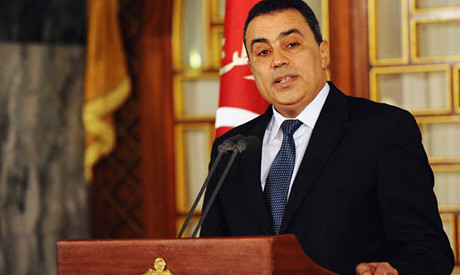
Tunisian Interim Prime Minister Mehdi Jomaa. He is putting together a 'technocratic' cabinet three years after a national uprising that ousted Ben Ali., a photo by Pan-African News Wire File Photos on Flickr.
Tunisia's last hope for democratic transition
Alia Soliman, Monday 20 Jan 2014
Premier Mehdi Jomaa moves to form a technocratic government to face up to Tunisia's numerous challenges
After the resignation earlier this month of Tunisia's Islamist prime minister, Ali Larayedh, Mehdi Jomaa, the new caretaker premier, is closing in on forming a new cabinet. Jomaa is to form a technocratic, non-partisan cabinet in order to end months of political deadlock and lead the country to fresh elections.
It is a rocky time for Tunisia, where economic problems reign, mistrust is deep between Islamists and secularists, and disappointed Tunisians, searching for light at the end of the tunnel, hold constant protests.
However, Tunisians are trying to have faith in Jomaa, hoping he will deliver.
Tunisia recently celebrated the third anniversary of its revolution and is on the verge of approving a post-revolution constitution.Applauded by many human rights organisations, the draft Tunisian constitution has been deemed by the Carter Center to underscore "the [Tunisian] authorities' strong commitment to democratic reform." Tunisia's constitutional commission allowed such NGOs to review drafts of the constitution as well as make recommendations on specific articles.
The resignation of Ali Larayedh of the Islamist Ennahda party was agreed upon before it happened. But Tunisians were sceptical and doubted that the Islamists would ever step down. Looking to the example of Egypt, Tunisians had that strong belief that Ennahda would buy time indefinitely and that Tunisia would take the same route that Egypt took under the Muslim Brotherhood.
Lotfi Azzouz, Tunisia country director at Amnesty International, told Ahram Online that after the resignation of Larayedh political tensions will ease and stability return. A neutral government would also help bring security to Tunisia.
"On the other hand, I doubt the new government's ability to question or accuse any of the previous governments in power on their human rights abuse or corruption," Azzouz added.
Painful measures soon
Mischa Benoit-Lavelle, writer at Tunisia Live and correspondent for France 24 in Tunisia, told Ahram Online that Tunisia's top priority is the economy and the unpopular reforms it needs to push through to address it.
"The second tranche of an IMF loan is going to depend on doing things like reducing the budget deficit by raising taxes or lowering subsidies. When they recently tried to raise vehicle taxes in the new public finance law, people revolted in Kasserine, Kef and other marginalised areas ... Larayedh suspended those increases, but Jomaa has to oversee some painful measures sooner or later," Benoit-Lavelle said.
Hafedh El-Ghrabi, a Tunisian lecturer and writer for The Huffington Post, believes that the situation will remain fragile, especially on the economic level and as well concerning security and fighting terrorist groups. Much will depend on the new premier's ability to create a consensus around himself and his cabinet.
El-Ghrabi believes Jomaa can "calm people down" by sending positive signals through his cabinet's composition, and making urgent decisions on taxation and other matters. “He has to prove that he is a man of action," easing the transition towards elections and stability, rather than engaging in interminable ideological battles.
Hatem Shalghami, a Tunisian activist says: “As a Tunisian I believe the stepping down of the Islamists on its own is not as important as having security and feeling that the life of a Tunisian citizen is important to the government.”
“Tunisians protested against the rule of Ben Ali when they felt that the Tunisian citizen had no value, and this is what we will continue to do, if our government fails to recognise our needs economically, politically and socially,” Shalghami added.
Technocracy, not ideology
“The new government will be a government of technocrats: professionals who do not abide by a rigid ideological commitment,” El-Gharbi states.
Sources speaking toAsharq Al-Awsataffirmed that Jomaa has taken important decisions regarding the formation of a new cabinet, with just a number of ministerial portfolios left to be filled.
"The technocratic government will likely include figures previously viewed as contenders to lead the caretaker government, including Bourguiba-era minister Mohamed Ennaceur, former Central Bank governor Mustapha Kamel Nabli, and Sebsi-era finance minister Jalloul Ayad," the paper reported.
"The Jomaa government will also include more than one female minister, while the Ministry of Women’s Affairs will likely be disbanded and its tasks assigned to other ministries," it added.
Azzouz told Ahram Online that the new government would be composed of figures who were not members of political parties, and that its core feature would be pragmatism.
http://english.ahram.org.eg/News/91934.aspx
No comments:
Post a Comment